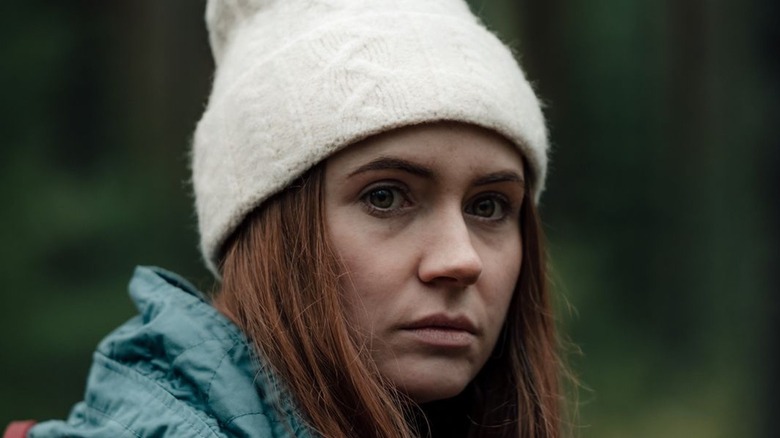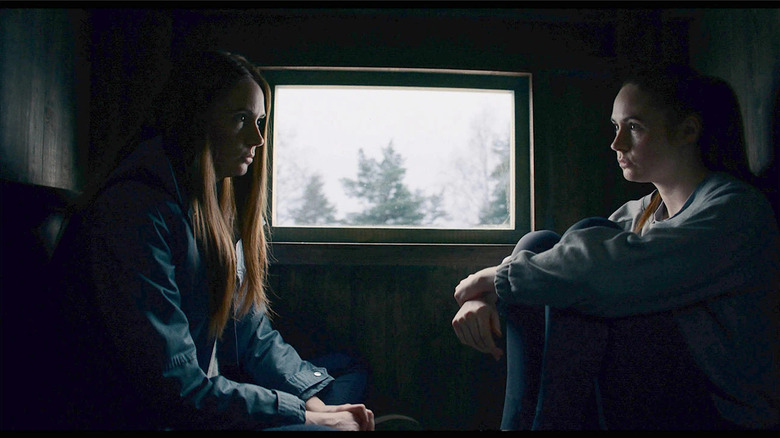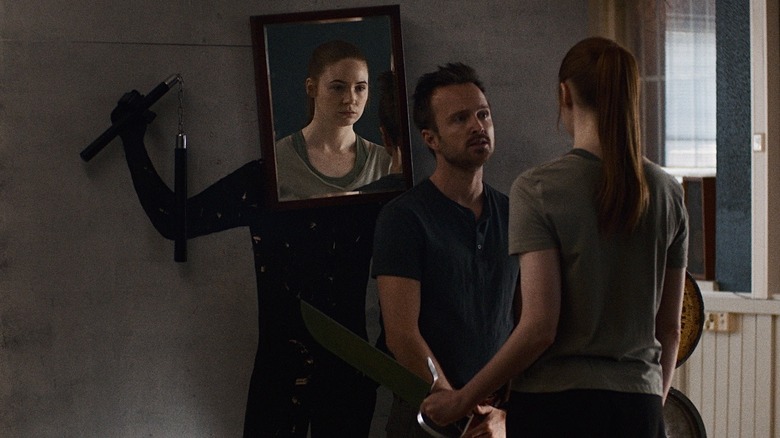Dual Review: Self Destruction
When they're really working, the films of Riley Stearns manage to be both hyper-specific and universal, conveying something we can all understand about human alienation, heartbreak, and even triumph through a very particular delivery mechanism. His dark comedies, which draw out laughter and discomfort in surprising and surprisingly subtle ways, have the capacity to say profound things about the most uncomfortable parts of us, even when he's reaching for a deliberate brand of high-concept strangeness.
That high-concept strangeness is the springboard for "Dual," Stearns' latest future, and arguably his most ambitious both narratively and thematically. Featuring a tremendous and tremendously game central cast anchored by Karen Gillan as two versions of the same woman, it's a sometimes squirm-inducing, always compelling, blackly comic look at an existential crisis that can only end in violence, and one of the most intriguing genre films of the year.
Sarah vs. Sarah
In the world of "Dual," terminally ill people have the option to clone themselves before death, creating a "Double" that will allow their friends and family to still have some version of them after the original has passed away. Sarah (Gillan), a young woman living a relatively listless life in an unnamed city, learns the ins and outs of how it all works when a sudden illness gives way to a terminal diagnosis. She's dying, and she suddenly has the option to recreate herself in service to her boyfriend Peter (Beulah Koale) and her omnipresent mother (Maija Paunio).
Though she's worried about certain implications of the process, Sarah decides to go through with the cloning, and begins educating her Double (also Gillan) on her likes and dislikes so the new Sarah can take her place when her inevitable death comes. Then, two unlikely things happen at once: The Double becomes more attractive to both Peter and her mother than the real Sarah's been in years, and Sarah finds out that, by some miracle, she's not dying after all. Based on government mandate, because there can't be two versions of the same person running around forever, this means only one thing: Sarah now has to duel her annoyingly perfect Double to the death, in one year's time.
This reality, and how Sarah comes to grips with it, makes up roughly the film's first act, with much of the rest of the film devoted to preparing for the clash of Sarahs as the original Sarah begins training with a brusque self-defense expert named Trent (Aaron Paul). Through Trent, Sarah works to get herself into fighting shape, but between all the burpees and the weapons training, Trent seems even more interested in forcing her to confront the specter of death as she almost literally prepares to try and kill herself. What that achieves, and how Sarah responds to it, is where "Dual" transforms from interesting premise to truly compelling story.
Attack of the clones
From the beginning, it's clear that "Dual" exists in a strange mirror of our own reality. All the things we recognize, from laptops to cell phones, are part of this world, but Stearns has rather deliberately crafted a warped reality, from the austere production design to the minimalist camera work to the slightly stilted, somewhat formal way in which everyone speaks. People tend to talk with sometimes jarring bluntness, even delivering lies and moments of flattery with a flattened, deliberate tone. It feels jarring, until you realize that it's supposed to be.
Even before she finds out she's dying, even before she realizes she needs a Double, and well before that Double starts to intrude on her life in ways she didn't imagine, Sarah reacts to the world around her like an alien from another world, struggling to gather joy or sustenance from a cold, distant place. She claims she loves "Mexican food" yet never seems to get beyond the drive-in of the local fast food taco place, craves affirmation and attention from her boyfriend yet never seems happy to see him, dodges her mother's calls until the moment she realizes someone else might be taking them. She's a woman adrift, lost in an uncaring world that seems to only want to kill her, at least until she's confronted with the very real prospect of death.
Gillan rises to the emotional, vocal, and physical challenges of this world and this character with true transformative spirit. She shrinks into Sarah, not so much physically transforming as diminishing the effervescence she's showed in things like "Doctor Who" and "Jumanji," dimming her light so we can watch it brighten, flicker, and flare in later scenes. When it comes time to play two versions of the same woman, she retains the tightness of Stearns' style, never fighting the restraints of the premise or the narrative, instead contorting herself to fit them in subtle, remarkable ways. It's a true showcase for her talents, and it's only elevated by the presence of Paul as a counterbalance to Sarah's listlessness. Like everyone else in the film, Trent is restrained, holding things back even as he encourages Sarah to unleash something, and Paul plays that restraint with a caged ferocity that makes him the perfect foil for Gillan. Together, they craft something very special that never goes where you think it's going, even as the film heads toward its endgame.
Indeed, the entirety of the film's third act unfolds in ways you probably don't expect, but it's not really about subverting the expectations of certain genre plots. You've seen these kinds of stories before, whether it's clone vs. clone or brother vs. brother, and Stearns is a sharp enough filmmaker to play with your expectations even in his own stripped-down sphere. But what's truly special about "Dual" isn't its clever plotting, though that's certainly worth watching. What's special about this film is its ability to get under your skin, to make you question your own choices, how dearly you're holding your own mortality. The true brilliance of the dark comedy running through the film is not its ability to ask what you'd do if you were dying, but its ability to ask whether or not you'd even notice if you were dying. Within that sometimes bleak, sometimes hilarious question, it creates something special.
"Dual" is in theaters April 15.


